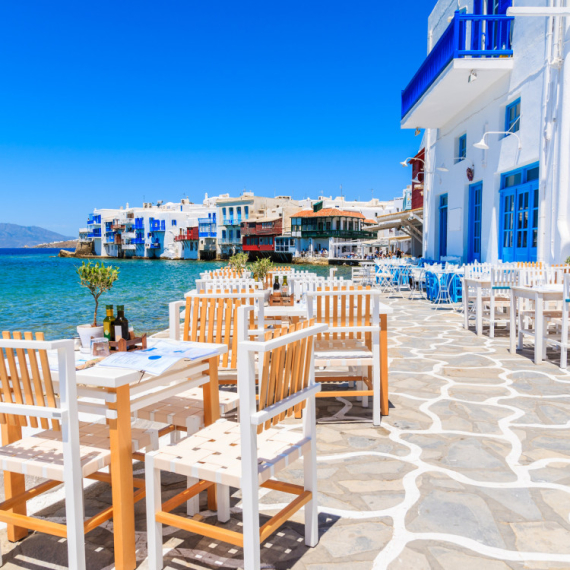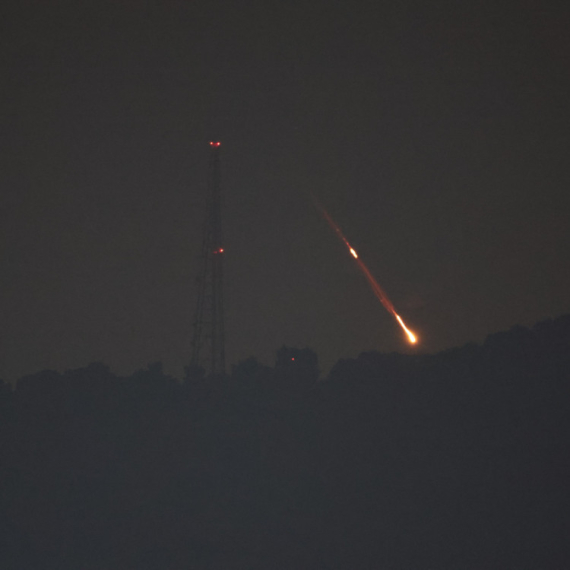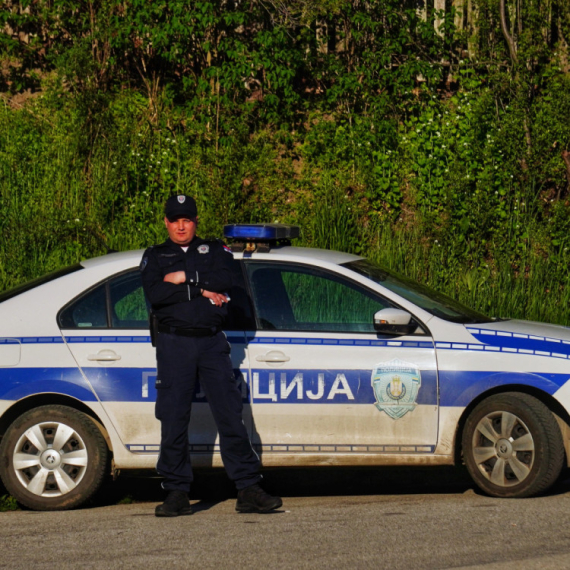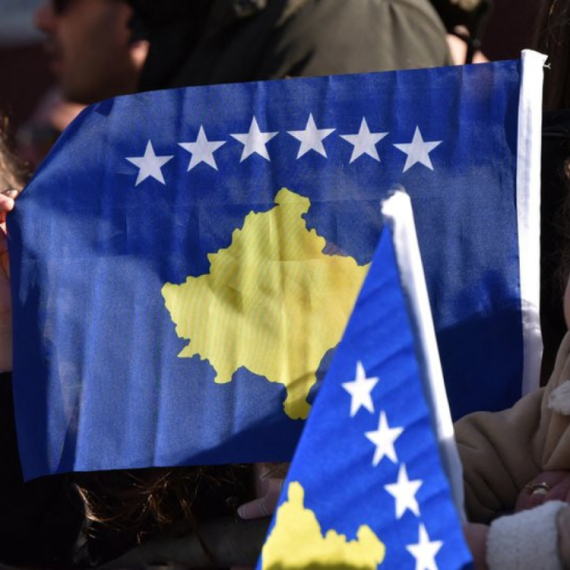Jeremić outlines foreign policy priorities
Serbia’s priorities include protecting sovereignty and territorial integrity, accelerating EU integration and regional cooperation, says Vuk Jeremić.
Thursday, 12.02.2009.
09:25

Serbia’s priorities include protecting sovereignty and territorial integrity, accelerating EU integration and regional cooperation, says Vuk Jeremic. The foreign minister said during a visit to Kragujevac on Wednesday that the central strategic priorities of the Serbian government were accelerating the European integration process and leading the country into full EU membership. Jeremic outlines foreign policy priorities According to him, those are best achieved alongside a third priority—establishing good neighborly relations and the best regional cooperation. Jeremic was visiting Kragujevac as part of next Monday’s celebrations for Republic Day. He said that Serbia had a very serious problem with regards to bilateral relations with the U.S., which was the leading sponsor of Kosovo’s unilateral independence declaration, adding that, despite that, it was necessary to find a way to cooperate with the U.S. administration. “We are going to try to insist on the issues which bring us closer, and not on those that divide us, and besides the administration, we’ll also engage in cooperation with institutions like the (U.S.) Congress,” said Jeremic at a conference at the National Strategy Forum in the Serbian-American Center. He added that he did not expect drastic changes in the U.S.’s worldview, saying that the U.S.’s current policy was likely to stay in force. Jeremic said that Feb. 17, the anniversary of Kosovo’s unilateral independence declaration, would be a “problematic day,” and did not rule out the possibility of instability in the southern Serbian region. The foreign minister believes that day, Feb. 17, will not be marked or remembered for long. “We’re going to do our utmost to reach a solution for the future status of Kosovo, which will not be based on secession attempts. Serbia has a plan for that, which only requires a little luck and more courage,” he said. Jeremic said that Serbia would be highlighting to the general public at large, both domestic and worldwide, the fifth anniversary of the March 17, 2004 pogrom carried out against the Serbs in Kosovo. “We will not allow that anniversary to disappear and we will constantly hark back to that date everywhere, in the Security Council, at UNESCO, and even on CNN,” said the foreign minister. He reproached church diplomacy which, he said, was very important in Serbian foreign policy strategy, for not having highlighted that date sufficiently, when, he said, 35 Serbian churches and monasteries had been set fire to in only two days. “The world must constantly be reminded of that,” he said. During an interview with the BBC, also on Wednesday, Jeremic said that resolving the future status of Kosovo and EU integration were two separate processes and that was the official policy. He said that that was “the official policy of Belgrade and Brussels” and that Belgrade would “do everything to keep it that way.” “If Kosovo recognition is set as a condition for Serbia to achieve any aim, it would be setting a condition for Serbia that would violate its Constitution,” added Jeremic. Noting that the political condition for EU accession was Serbia’s full cooperation with the Hague Tribunal, he said that that meant Serbia doing everything it could and Hague Chief Prosecutor Serge Brammertz submitting regular reports to the EU. “We are satisfied with the cooperation that we have with him. It is important that he continue to give regular reports to the EU, but we think that the appraisal of an EU mission that was to come to Serbia could complement his reports,” said the foreign minister. “Serbia is a key country in the region and, if it is on the right path, I am sure that all of the Balkans will be on the right path with it. If Serbia stumbles, or loses its energy, will, focus, vision, it won’t be possible to complete the process of Balkan integration within the EU —and by the same token, the process of unifying Europe,” concluded Jeremic. “We believe that we don’t have anything to hide as far as cooperation with the Hague is concerned. We believe that the claim that Serbia is not cooperating with the Hague simply doesn’t hold any water. I don’t see why anyone who claims to have good intentions would refuse a bona fide invitation, an invitation in the best possible will to the European Union, to come and see what we are doing,” he said. Concerning the six-point plan, Jeremic said that was the UN secretary general’s plan, which was supported by the Security Council, and that implementation of the plan should follow discussions between Belgrade and UNMIK. “That conversation should begin as soon as possible, and that is hugely importantly. We understand the security situation in Pristina, UNMIK Chief Lamberto Zannier’s problems and the international civil presence in the region, and we understand what kind of pressure the Albanians there can put on them. However, we have to carry out what the Security Council decided when it adopted the secretary general’s plan,” stressed the minister. “The secretary general’s plan envisions our cooperation with UNMIK, specifically with Mr. Zannier and his people,” he said, answering a BBC question about whom Belgrade intended to cooperate with. Vuk Jeremic (FoNet, archive)
Jeremić outlines foreign policy priorities
According to him, those are best achieved alongside a third priority—establishing good neighborly relations and the best regional cooperation.Jeremić was visiting Kragujevac as part of next Monday’s celebrations for Republic Day.
He said that Serbia had a very serious problem with regards to bilateral relations with the U.S., which was the leading sponsor of Kosovo’s unilateral independence declaration, adding that, despite that, it was necessary to find a way to cooperate with the U.S. administration.
“We are going to try to insist on the issues which bring us closer, and not on those that divide us, and besides the administration, we’ll also engage in cooperation with institutions like the (U.S.) Congress,” said Jeremić at a conference at the National Strategy Forum in the Serbian-American Center.
He added that he did not expect drastic changes in the U.S.’s worldview, saying that the U.S.’s current policy was likely to stay in force.
Jeremić said that Feb. 17, the anniversary of Kosovo’s unilateral independence declaration, would be a “problematic day,” and did not rule out the possibility of instability in the southern Serbian region.
The foreign minister believes that day, Feb. 17, will not be marked or remembered for long.
“We’re going to do our utmost to reach a solution for the future status of Kosovo, which will not be based on secession attempts. Serbia has a plan for that, which only requires a little luck and more courage,” he said.
Jeremić said that Serbia would be highlighting to the general public at large, both domestic and worldwide, the fifth anniversary of the March 17, 2004 pogrom carried out against the Serbs in Kosovo.
“We will not allow that anniversary to disappear and we will constantly hark back to that date everywhere, in the Security Council, at UNESCO, and even on CNN,” said the foreign minister.
He reproached church diplomacy which, he said, was very important in Serbian foreign policy strategy, for not having highlighted that date sufficiently, when, he said, 35 Serbian churches and monasteries had been set fire to in only two days.
“The world must constantly be reminded of that,” he said.
During an interview with the BBC, also on Wednesday, Jeremić said that resolving the future status of Kosovo and EU integration were two separate processes and that was the official policy.
He said that that was “the official policy of Belgrade and Brussels” and that Belgrade would “do everything to keep it that way.” “If Kosovo recognition is set as a condition for Serbia to achieve any aim, it would be setting a condition for Serbia that would violate its Constitution,” added Jeremić.
Noting that the political condition for EU accession was Serbia’s full cooperation with the Hague Tribunal, he said that that meant Serbia doing everything it could and Hague Chief Prosecutor Serge Brammertz submitting regular reports to the EU.
“We are satisfied with the cooperation that we have with him. It is important that he continue to give regular reports to the EU, but we think that the appraisal of an EU mission that was to come to Serbia could complement his reports,” said the foreign minister.
“Serbia is a key country in the region and, if it is on the right path, I am sure that all of the Balkans will be on the right path with it. If Serbia stumbles, or loses its energy, will, focus, vision, it won’t be possible to complete the process of Balkan integration within the EU —and by the same token, the process of unifying Europe,” concluded Jeremić.
“We believe that we don’t have anything to hide as far as cooperation with the Hague is concerned. We believe that the claim that Serbia is not cooperating with the Hague simply doesn’t hold any water. I don’t see why anyone who claims to have good intentions would refuse a bona fide invitation, an invitation in the best possible will to the European Union, to come and see what we are doing,” he said.
Concerning the six-point plan, Jeremić said that was the UN secretary general’s plan, which was supported by the Security Council, and that implementation of the plan should follow discussions between Belgrade and UNMIK.
“That conversation should begin as soon as possible, and that is hugely importantly. We understand the security situation in Priština, UNMIK Chief Lamberto Zannier’s problems and the international civil presence in the region, and we understand what kind of pressure the Albanians there can put on them. However, we have to carry out what the Security Council decided when it adopted the secretary general’s plan,” stressed the minister.
“The secretary general’s plan envisions our cooperation with UNMIK, specifically with Mr. Zannier and his people,” he said, answering a BBC question about whom Belgrade intended to cooperate with.



































Komentari 13
Pogledaj komentare